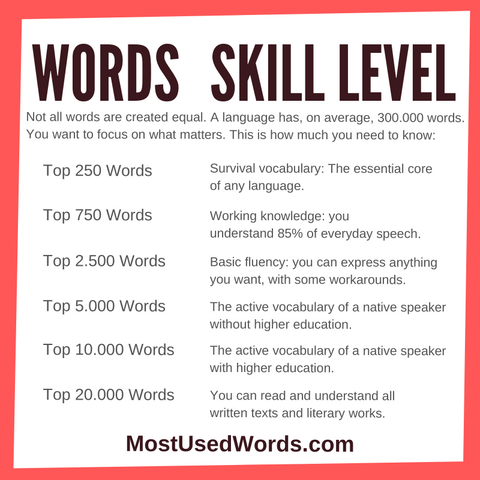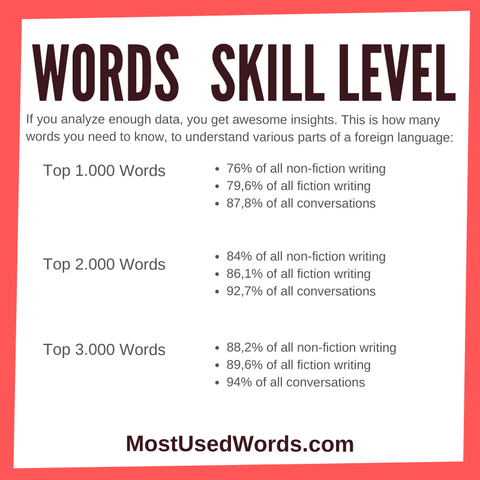
How To - Really - Learn A Language Quickly And Efficiently - 5 Unkown but Common Sense Principles
Most fancy language learning courses try to give you the appearance of learning a language. If you genuinely want to learn a new language quickly, follow these five common-sense principles:
Principle 1: Learn The Most Frequently Used Words First
The Pareto Principle states that 20% of efforts result in 80% of results.
You see this everywhere in the world. Pareto was an Italian economist who discovered that 20% of the landowners owned 80%. It is a fact that 20% of the world's wealthiest people account for over 80% of the world's wealth.
This principle applies to language learning too. That's why you want to focus on the most frequently used parts of a language.
Among linguists, it is generally accepted that no more than 500 to 1500 words are actively used in daily speech. This goes for pretty much every natural language.
An extensive study by Brigham Young University has determined that only a few frequently used words are required to speak a language, as indicated in the chart below.

This second table shows that the law of diminishing returns affects language learning:

Learning the 1000 most commonly used words allows you to understand almost 90% all conversations. Whereas knowing an additional 1000 or 2000 vocabulary items, will only marginally increase your comprehension.
It is essential, however, that those first 1000 words you learn are the most frequently used words.
Not just randomly selected words that are easy to teach (such as the vocabulary used in most language learning material).
If you made a list of the most commonly spoken words, you would find that most of them are:
- prepositions (over, against, with)
- articles (a, an, the)
- pronouns (he, they, them, us)
- conjunctions (but, also)
Although very common and definitely something to know, these vocabulary items do not convey a great deal of meaning. If you removed these words from a sentence, you would still understand the gist of it.
More meaningful vocab tend to be:
- verbs (to want, to have, to be, to like)
- nouns (person, time, house, food, home, friend)
- adjectives (big, small, hot, warm, cold)
Your focus should be on knowing the most frequently used words that convey meaning: the most often spoken verbs, nouns, and adjectives.
It becomes easier to learn new words from context once you know the most common and meaningful vocabulary. Knowing a few key words allows you to guess the meaning of yet unknown words in the phrase.
Principle 2: Starting from the core, not the fringe
Most learning material will teach you words and phrases that you would not normally say outside of the course context.
In many language education programs, you would learn words such as football, roundabout, and toothbrush early on in the curriculum.
If you don't specifically want to make a reference to football, roundabouts, or toothbrushes, then they would not be too helpful.
One of my favorite useless phrases is: "I brush my teeth in the bathroom." I can't remember when I ever used that sentence in my 30 years of existence.
These courses designed so you can be fluent in a whole range of situations. This is a good idea in theory, but extremely inefficient in real life.
Instead, you should focus more on learning core verbs and general-use nouns. Core verbs work with any subject matter.
Most courses shy away from being verb-centric early on. Most people think that verbs are complicated because of the conjugations.
I once had a Polish girlfriend who didn't care much for verbal conjugations. A lot was [verb root]+ing "going", "doing", especially when we started dating and she didnt speak much English yet.
"I going to shop. I going eating. I was shopping. You was at home? Mabey you give your girlfriend kiss? We go walking in park today?"
Granted, the English was basic, but I had zero problems understanding her. This insight was monumental. Do not care too much about verbal conjugation at first. It will come naturally.
Forget everything your high school Spanish thaught you about grammar.
It is not that important in communication. You won't "fail" in real-life language learning if you screw up a bit of grammar.
Moreover, many frequently used verbs are irregular verbs, thereby increasing difficulty.
Every person has different requirements for a language, depending on their goals.
For example: if you're going to Spain for 3 months to work at a cool beach bar, you would need a different set of vocabulary than if you were a student going abroad to do your law internship.
What both examples have in common, is that they both need to know the same core words. Where they differ is the periphery, or the vocabulary specific to their field.
If you learn the core words of a language, you can start conversing immediately. You can then further extend your vocabulary to what is useful and relevant for you, specifically.
The building blocks of language learning
Imagine if you were building a house. At first, you would need the foundation. Then you create a skeleton structure of wooden beams.
At this stage, it would not look like a regular house. There are no carpet floors, brick walls, glass windows, or doors set in place.
However, you need this base structure before you can install anything that makes a house a house.
The same is true for language. First, you must have a solid foundation based on the core words of that language. Once you have that base, then you can easily add various specific elements you require.
Most courses try to sell you something that looks like a completed home already. Unfortunately, they tend to lack the proper foundation.
Principle 3: Both Immersion and Analytical learning methods are important
We can divide learning into two types. Immersion based learning and analytical based learning.
Immersion
Everyone starts learning by immersion. With immersion-based learning, you place yourself entirely in the learning environment and obtain knowledge by intuition and direct feedback. You, when you were a child, got totally immersed in your native language.
This style of learning does not have rules or explanations. The student learns through listening, reading, observing, speaking, and making associations on their own.
Analytical based learning is a more academic form of learning. It involves understanding the structure and rules of a language and why certain things are said one way and not another.
Rosetta Stone and Rocket Languages, for instance, try to simulate an immersion-based approach.
Most textbooks and language classes use an analytical approach.
Many people have used Rosetta Stone. The most common complaint is that students do not understand why the program uses some words in one context, and then uses a different word with the same definition in another context.
The Rosetta Stone immersion method does not provide any explanation. This often leads to students getting demotivated and giving up on their language learning.
At the same time, many students have studied languages in school for several years using the analytical model, and they still cannot communicate properly. I would wager big cash money that this is 98% of my high school French and German class.
The solution? You want to use both methods. Immersion is important, but having a basic understanding of the most frequently used rules is equally important.
Principle 4: Don't try and remember everything. Stop learning hard, start learning smart.
Another often-heard reason for halting language learning is that memorization of words might seem overwhelming.
How are you going to learn 1000, 2500, 5000, or even 10.000 words?
Simple, you break it down, piece by piece. Regularly making small changes over time, add up to massive changes.
You want to limit the number of new words you learn during a session to seven to twelve, ONLY.
You will reach much more if you focus on a handful of commonly used words with meaning, than when you haphazardly start learning a massive list of rarely used words.
The same set of core words can be used to produce a variety of useful sentences.
After just a short time, and with very little memorization, you will discover that you can already communicate effectively with a small variety of commonly used words and phrases.
Just like you can play blues guitar, after learning the elementary 7 note blues scale. (yes, you can literally play the blues after 5 minutes)
Principle 5: Utile Dulci: Find Ways to Combine Your Passions With Language Learning.
"Utile Dulci" is Latin and can be translated as "the useful and the pleasant combined."
The language you use is based on your passions and interests.
The core vocab will be the same for most people, the "filler vocabulary" will be different.
Once you have learned the most frequently used meaningful words, then you want to learn the peripheral words: the vocabulary that is specific to your areas of interest.
If you are passionate about something, you will find it easier to learn, because it doesn't feel like "something you have to do." You want to combine this with your language studies.
Like, if you are a musician, you can learn vocabulary in the new language related to music, concerts, bands, guitars, etc. Read articles about artists, how to set up a home studio, or whatever, in the language you're learning.
Fire up the ol' radio, but tune into a different language broadcat. The internet helps greatly here.
You will acquire these new words swiftly since you will be transferring your passion for your hobby to a passion for the language.
Summary
Apply these five principles, and you can learn any language quickly and efficiently.